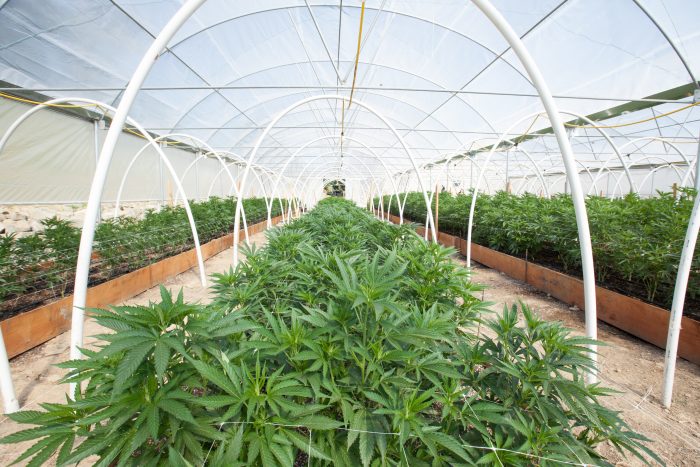The initial legislation for the approval of medical cannabis in Iowa was actually passed back in 2017, when voters opted for House File 524, which is an Act establishing rules and regulations on “Medical Cannabidiol” in the state.
Please note; while we aim to keep this pages fully up to date with the latest information, cannabis laws are always changing. We encourage you to verify these rules and regulations in the official legal text, which we’ve linked throughout the page for your convenience.
Iowa’s Medical Marijuana Law
Program Rules & Regulations
On May 12, 2017, Gov. Terry Branstad signed HB 524 into law. The law will allow certain patients in the state to use, possess, and access low-THC cannabis oil with their doctor’s authorization. A 2014 law only gave patients with seizure disorders a defense to prosecution for use of this medicine. The 2017 law expands the conditions that qualify for low-THC oils, prevents prosecutions (not just convictions), and will allow in-state access to the cannabis oil by December 1, 2018.
Qualifying conditions: Cancer, if the underlying condition or treatment produces severe or chronic pain, nausea or severe vomiting, or cachexia or severe wasting syndrome; multiple sclerosis with severe and persistent muscle spasms; seizures, including those characteristic of epilepsy; AIDS or HIV; Crohn’s disease; amyotrophic lateral sclerosis; any terminal illness, with a probable life expectancy of under one year, and if the illness or its treatment produces severe or chronic pain, nausea or severe vomiting, or cachexia or severe wasting syndrome; Parkinson’s disease; and untreatable pain, meaning pain whose cause cannot be removed by general accepted medical practice and the full range of pain management modalities has been used without success or with intolerable side effects.
Written certifications: In order to enroll in the program, patients must obtain a written certification from their doctor, meaning a physician licensed to practice medicine and surgery or osteopathic medicine and surgery. The doctor must be a patient’s primary care provider. Patients must be permanent residents of the state. Patients under 18 can only enroll in the program through their caregivers.
Cannabis oil limits: THC is capped at three percent. Smoking is not permitted. The Department of Health will determine what quantity of cannabidiol patients and caregivers will be permitted to possess.
Out-of-state reciprocity: Patients visiting Iowa from another state who are registered with a cannabidiol program in their home state can possess and consume cannabis in Iowa, but they are not permitted to make purchases. The law allows Iowa patients to register to obtain the oil in Minnesota. However, Minnesota’s medical cannabis program does not currently permit this.
License Applications for Caregivers and Patients
Caregivers: Under the program, caregivers can enroll to help patients pick up and use the oil. Caregivers must be residents of Iowa or a bordering state to Iowa and at least 18 years of age. The patients’ doctors must designate them as a necessary caretaker.
Registration card fees: Card fees for patients are set at $100. However, if the patient receives social security disability benefits, supplemental security insurance payments, or is enrolled in a medical assistance program, the fee is $25. Caregiver cards are $25.
Cultivators (also commonly referred to as Producers or Growers) –
Iowa Cultivation Laws
641—154.17(124E) Cultivation operations.
154.17(1) Operating documents. The operating documents of a manufacturer shall include all of the following:
- Procedures for the oversight of the manufacturer, including descriptions of operational and management practices regarding:
- The forms and quantities of medical cannabidiol products that are produced at the manufacturing facility;
- The methods of planting, harvesting, drying, and storing cannabis;
- The estimated types and amounts of all crop inputs used in the production of medical cannabidiol;
- The estimated types and amounts of medical cannabidiol waste and plant material waste to be generated;
- The disposal methods for all waste materials;
- Employee training methods for the specific phases of production;
- Biosecurity measures used in the production and manufacturing of medical cannabidiol;
- Strategies for identifying and reconciling discrepancies in the inventory of plant material or medical cannabidiol;
- Sampling strategy and quality testing for labeling purposes;
- Medical cannabidiol packaging and labeling procedures;
- Procedures for recall and market withdrawal of medical cannabidiol;
- Plans for responding to a security breach at a manufacturing facility or while medical cannabidiol is in transit to a dispensary;
- A business continuity plan;
- Records relating to all transport activities; and
- Other information requested by the department.
- Procedures to ensure accurate record keeping.
- Procedures for the implementation of appropriate security measures to deter and prevent the theft of medical cannabidiol and unauthorized entrance into areas containing medical cannabidiol.
154.17(2) Prohibited activities.
- Own or operate a medical cannabidiol manufacturing facility unless the manufacturer is licensed by the department pursuant to Iowa Code chapter 124E and these rules;
- Produce or manufacture medical cannabidiol in any location except in those areas approved by the department;
- Sell, deliver, transport, or distribute medical cannabidiol from any location except its manufacturing facility or a dispensary facility;
- Produce or manufacture medical cannabidiol in Iowa for sales or distribution outside of Iowa;
- Sell or distribute medical cannabidiol to any person or business other than a dispensary;
- Refuse to sell, deliver, transport, or distribute medical cannabidiol in any form or quantity produced by the manufacturer to a dispensary, unless deemed appropriate in the manufacturer’s reasonable business judgment and approved by the department in writing;
- Transport or deliver medical cannabidiol to any location except as allowed in subrule
154.22(1);
- Sell medical cannabidiol that is not packaged and labeled in accordance with rule 645—154.21(124E);
- Sell medical cannabidiol in any form or quantity other than a form or quantity approved by the department, subject to recommendation by the medical cannabidiol board and approval by the board of medicine;
- Permit any person to consume medical cannabidiol on the property of the manufacturer;
- Employ a person who is under 18 years of age or who has been convicted of a disqualifying felony offense;
- Manufacture edible medical cannabidiol products.
154.17(3) Criminal background investigations.
- A manufacturer shall not have been convicted of a disqualifying felony offense and shall be subject to a background investigation conducted by the department of public safety, including but not limited to a national criminal history record check.
- An employee of a manufacturer shall not have been convicted of a disqualifying felony offense and shall be subject to a background investigation conducted by the department of public safety, including but not limited to a national criminal history background check.
154.17(4) Relationship to health care practitioners. A manufacturer shall not share office space with, refer patients to, or have any financial relationship with a health care practitioner.
What kind of tracking system do I need to operate a Cultivation Facility?
Most states require an extensive seed-to-sale cannabis tracking system to monitor cultivation efforts and inventory. Our cultivation seed-to-sale-tracking solution provides comprehensive data tracking with an emphasis on compliance. Customized to meet the unique regulatory frameworks in each state, BioTrack also features an all-in-one business tool to help you operate every aspect of the cultivation business by itself, or as part of the vertically-integrated cannabis business.
Iowa Cannabis Manufacturer Laws
641—154.17(124E) Manufacturer operations.
154.17(1) Operating documents. The operating documents of a manufacturer shall include all of the following:
- Procedures for the oversight of the manufacturer, including descriptions of operational and management practices regarding:
- The forms and quantities of medical cannabidiol products that are produced at the manufacturing facility;
- The methods of planting, harvesting, drying, and storing cannabis;
- The estimated types and amounts of all crop inputs used in the production of medical cannabidiol;
- The estimated types and amounts of medical cannabidiol waste and plant material waste to be generated;
- The disposal methods for all waste materials;
- Employee training methods for the specific phases of production;
- Biosecurity measures used in the production and manufacturing of medical cannabidiol;
- Strategies for identifying and reconciling discrepancies in the inventory of plant material or medical cannabidiol;
- Sampling strategy and quality testing for labeling purposes;
- Medical cannabidiol packaging and labeling procedures;
- Procedures for recall and market withdrawal of medical cannabidiol;
- Plans for responding to a security breach at a manufacturing facility or while medical cannabidiol is in transit to a dispensary;
- A business continuity plan;
- Records relating to all transport activities; and
- Other information requested by the department.
- Procedures to ensure accurate record keeping.
- Procedures for the implementation of appropriate security measures to deter and prevent the theft of medical cannabidiol and unauthorized entrance into areas containing medical cannabidiol.
154.17(2) Prohibited activities. A manufacturer shall not:
- Own or operate a medical cannabidiol manufacturing facility unless the manufacturer is licensed by the department pursuant to Iowa Code chapter 124E and these rules;
- Produce or manufacture medical cannabidiol in any location except in those areas approved by the department;
- Sell, deliver, transport, or distribute medical cannabidiol from any location except its manufacturing facility or a dispensary facility;
- Produce or manufacture medical cannabidiol in Iowa for sales or distribution outside of Iowa;
- Sell or distribute medical cannabidiol to any person or business other than a dispensary;
- Refuse to sell, deliver, transport, or distribute medical cannabidiol in any form or quantity produced by the manufacturer to a dispensary, unless deemed appropriate in the manufacturer’s reasonable business judgment and approved by the department in writing;
- Transport or deliver medical cannabidiol to any location except as allowed in subrule
154.22(1);
- Sell medical cannabidiol that is not packaged and labeled in accordance with rule 645—154.21(124E);
- Sell medical cannabidiol in any form or quantity other than a form or quantity approved by the department, subject to recommendation by the medical cannabidiol board and approval by the board of medicine;
- Permit any person to consume medical cannabidiol on the property of the manufacturer;
- Employ a person who is under 18 years of age or who has been convicted of a disqualifying felony offense;
- Manufacture edible medical cannabidiol products.
154.17(3) Criminal background investigations.
- A manufacturer shall not have been convicted of a disqualifying felony offense and shall be subject to a background investigation conducted by the department of public safety, including but not limited to a national criminal history record check.
- An employee of a manufacturer shall not have been convicted of a disqualifying felony offense and shall be subject to a background investigation conducted by the department of public safety, including but not limited to a national criminal history background check.
154.17(4) Relationship to health care practitioners. A manufacturer shall not share office space with, refer patients to, or have any financial relationship with a health care practitioner.
What kind of tracking system do I need to operate a Processing or Manufacturing Facility?
Most states require an extensive seed-to-sale cannabis tracking system to monitor processing and manufacturing efforts, which is especially important in this part of the supply chain due to conversions into multiple byproducts and higher amounts of waste. Our processing seed-to-sale-tracking solution provides comprehensive conversion tracking focused on compliant data points. Customized to meet the unique regulatory frameworks in each state, BioTrack also features an all-in-one business tool to help you operate every aspect of the cultivation business by itself, or as part of the vertically-integrated cannabis business.
1.1 – Introduction
The vision of the Office of Medical Cannabidiol (OMC) at the Iowa Department of Public Health is to have a high-quality, effective, and compliant medical cannabidiol program for Iowa residents with serious medical conditions. Once implemented, the program will ensure access to medical cannabidiol products to patients with serious medical conditions at five dispensaries across the state.
OMC will work to balance a patient’s need for access to low-cost treatments with the requirement to ensure the safety and efficacy of the products. Paramount to patient safety and care is making sure that each medical cannabidiol product sold to a patient is tested for harmful contaminants and that product labels accurately reflect the content and potency of the medical cannabidiol being dispensed.
1.2 – Purpose
The purpose of this document is to provide licensed Iowa medical cannabidiol manufacturers and laboratories with the required and recommended best practices for the collection and analysis of medical cannabidiol and other finished medical cannabidiol products. The governing statute of the Office of Medical Cannabidiol is Iowa Code chapter 124E and the associated administrative rules are found in 641 Iowa Administrative Code chapter 154.
Iowa Dispensary Laws
641—154.17(124E) Dispensary operations.
154.17(1) Operating documents. The operating documents of a manufacturer shall include all of the following:
- Procedures for the oversight of the manufacturer, including descriptions of operational and management practices regarding:
- The forms and quantities of medical cannabidiol products that are produced at the manufacturing facility;
- The methods of planting, harvesting, drying, and storing cannabis;
- The estimated types and amounts of all crop inputs used in the production of medical cannabidiol;
- The estimated types and amounts of medical cannabidiol waste and plant material waste to be generated;
- The disposal methods for all waste materials;
- Employee training methods for the specific phases of production;
- Biosecurity measures used in the production and manufacturing of medical cannabidiol;
- Strategies for identifying and reconciling discrepancies in the inventory of plant material or medical cannabidiol;
- Sampling strategy and quality testing for labeling purposes;
- Medical cannabidiol packaging and labeling procedures;
- Procedures for recall and market withdrawal of medical cannabidiol;
- Plans for responding to a security breach at a manufacturing facility or while medical cannabidiol is in transit to a dispensary;
- A business continuity plan;
- Records relating to all transport activities; and
- Other information requested by the department.
- Procedures to ensure accurate record keeping.
- Procedures for the implementation of appropriate security measures to deter and prevent the theft of medical cannabidiol and unauthorized entrance into areas containing medical cannabidiol.
154.17(2) Prohibited activities.
- Own or operate a medical cannabidiol manufacturing facility unless the manufacturer is licensed by the department pursuant to Iowa Code chapter 124E and these rules;
- Produce or manufacture medical cannabidiol in any location except in those areas approved by the department;
- Sell, deliver, transport, or distribute medical cannabidiol from any location except its manufacturing facility or a dispensary facility;
- Produce or manufacture medical cannabidiol in Iowa for sales or distribution outside of Iowa;
- Sell or distribute medical cannabidiol to any person or business other than a dispensary;
- Refuse to sell, deliver, transport, or distribute medical cannabidiol in any form or quantity produced by the manufacturer to a dispensary, unless deemed appropriate in the manufacturer’s reasonable business judgment and approved by the department in writing;
- Transport or deliver medical cannabidiol to any location except as allowed in subrule
154.22(1);
- Sell medical cannabidiol that is not packaged and labeled in accordance with rule 645—154.21(124E);
- Sell medical cannabidiol in any form or quantity other than a form or quantity approved by the department, subject to recommendation by the medical cannabidiol board and approval by the board of medicine;
- Permit any person to consume medical cannabidiol on the property of the manufacturer;
- Employ a person who is under 18 years of age or who has been convicted of a disqualifying felony offense;
- Manufacture edible medical cannabidiol products.
154.17(3) Criminal background investigations.
- A manufacturer shall not have been convicted of a disqualifying felony offense and shall be subject to a background investigation conducted by the department of public safety, including but not limited to a national criminal history record check.
- An employee of a manufacturer shall not have been convicted of a disqualifying felony offense and shall be subject to a background investigation conducted by the department of public safety, including but not limited to a national criminal history background check.
154.17(4) Relationship to health care practitioners. A manufacturer shall not share office space with, refer patients to, or have any financial relationship with a health care practitioner.
What kind of point-of-sale do I need to operate a Dispensary?
Most states require dispensaries to track and trace all of their cannabis-related products for regulatory and compliance reporting requirements. Our Dispensary Point of Sale and inventory management system provides comprehensive seed-to-sale cannabis tracking with a focus on compliant data points. If your state requires seed-to-sale systems to stay compliant, BioTrack has you covered. Our system is customized to meet the unique regulatory frameworks in each and every state.






